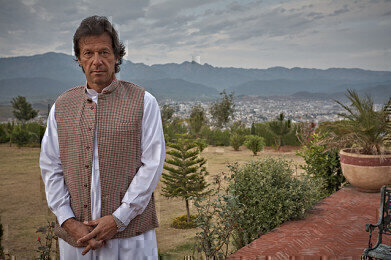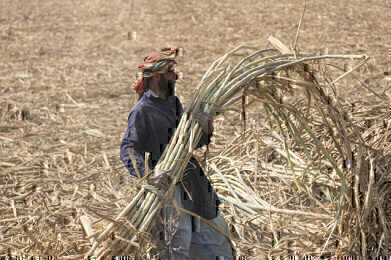-
 Prime Minister Imran Khan
Prime Minister Imran Khan -

Green Energy
Solar-assisted hybrid gasification of biomass and urban wastes
Aug 09 2021
Author credit - Stephen B. Harrison and Allegra Cresswell-Turner, sbh4 consulting
In 2016, Hybrid Gasification Ltd (HGL) based in UK and Green Sands Engineering (GSE) developed a novel technology to convert biomass to syngas. This project consists of solar-assisted gasification using village combustible residues to produce methane and hydrogen. The gases would be stored locally and used locally for heating and cooking applications to replace wood and biomass combustion in stoves. After years of development, it is now ready for commercial demonstration.
The project is aimed at rural economies in Pakistan and similar remote locations, with a highly agricultural economy. It has been led by Dr Abdullah Malik, who worked in Pakistan as part of the regulatory body OGRA (Oil & Gas Regulatory Authority) for 3 years and served under the administration of Prime Minister Imran Khan for over a year.
Empowering off-grid rural economies
According to Dr Malik, “The project will be novel in tackling issues of biomass and other combustible household residues that have no use in Pakistan’s urban and village localities, currently producing around 10 mega tonnes of oil equivalent per year.” Over the past few decades, Pakistan has developed a formidable gas sector, with its economy surviving helped by the abundant initial gas discoveries.
The natural gas market of Pakistan is amongst the biggest in Asia and the country was gas self-sufficient until 2005, from then on gas production has not been able to keep up with the gas demand of the country and LNG imports through terminals in the Karachi region with regasification capability have been implemented to fill the gap. Discussions are ongoing about the construction of a natural gas pipeline that would run from Turkmenistan, through Afghanistan to Pakistan and then on to India. However, difficulties in securing finance for fossil fuel projects and security issues have delayed the project. Local gas production is therefore a short-term imperative.
Pakistan has a large amount of agricultural and biomass resources, which have not been utilised due to difficulties with collection and transportation to centralised energy facilities. Furthermore, waste-recovered biomass is not directly suitable for use in these biomass power plants or heating boilers. Pakistan has a total installed power generation capacity of around 40,000 MW, including more than 40 bagasse (sugar cane waste) fired power stations. This type of plant offers a solution that can build on the established use of agricultural wastes for power generation, where these biomass resources can replace the natural gas demand.
The perfect community for this project to thrive in, is one which is off the gas grid, has access to solar power and bio-wastes and has a culture of burning biomass for heating. Other rural economies around the world, such as India, Bangladesh, Iran, and other Southern Asian countries that have a similar profile to Pakistan, could equally benefit from the solar-assisted hybrid gasification of biomass wastes.
Biomass wastes to avoid air pollution, stubble burning and deforestation
The system is designed to operate for 6-8 hours per day, when sun is usually guaranteed. It can use crop stubble in a constructive way, as opposed to being burnt irresponsibly. It also enables the syngas to be cleaned by going through a chemical scrubbing mechanism, so that people won’t be exposed to hazardous vapours, such as carbon monoxide and sulphur dioxide, when using their stoves.
The gasification plant will be designed to operate with most types of biomass and farm residue, such as animal wastes, husks, straws, cotton gin, corn cobs and other biomass available in typical rural villages. Additionally, other combustible domestic and urban wastes such as, vegetable residues, sludge from drains, plastics, spent grease and oils can also be gasified easily.
According to Dr Malik, “Pakistan’s primary energy supply mix clearly shows Natural gas as playing a major role in the country’s economic development by accounting for nearly 50% of its total primary energy supply.” This therefore poses a huge obstacle towards reaching carbon neutrality, which is where solar-assisted gasification comes in. The project outcome is deemed to benefit the Pakistan Government’s policy to reduce greenhouse gas emissions, helping to meet The Paris Agreement requirements to limit climate change and carbon dioxide emissions.
The plant is designed to run for more than 20 years, with solar energy as the main source of electricity. For a typical small-scale village, with about 100 households, the initial capex would be circa USD 0.5 million, with the ability to process around 4 tonnes of feedstock per day.
Events
IWA World Water Congress & Exhibition
Aug 11 2024 Toronto, Canada
Aug 25 2024 Stockholm, Sweden and online
Sep 03 2024 Mexico City, Mexico
Sep 03 2024 Mexico City, Mexico
Sep 03 2024 San Diego, CA, USA













